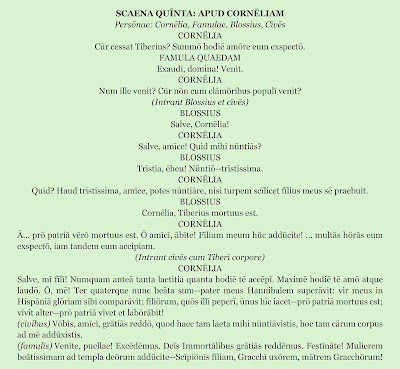[i]
What phrase in Latin does Cornelia use to show her great love for
Gracchus? (1)
[i] Summō hodiē amōre eum exspectō.
[ii]
What makes Cornelia think that Gracchus is not coming? (1)
[ii] the people are not shouting │ Cūr nōn cum clāmōribus
populī venit?
[iii]
How does Blossius describe the news he is bringing? (1)
[iii] very sad (the saddest) │ Nūntiō -- trīstissima.
[iv]
According to Cornelia, the only way the news could be so bad is if … (1)
[iv] Gracchus has shown
himself to be disgraceful / dishonourable│ Haud trīstissima, amīce, potes
nūntiāre, ¦ (1) nisi turpem scīlicet fīlius meus sē praebuit.
[You cannot announce very sad news ¦ (1) unless my son, of course,
has shown himself (to be) disgraceful]
[v]
What does Blossius say to her in reply? (1)
[v] Tiberius is dead │ Tiberius mortuus est.
[vi]
What reason does Cornelia give for this? (1)
[vi] He has truly died for the fatherland │ prō patriā vērō
mortuus est.
[vii]
What two instructions does Cornelia give her friends? (3)
[vii] (1) go away (2) bring her son (3) here │ Ō amīcī,
(1) ābīte! (2) Fīlium meum (3) hūc (2) addūcite!
[viii]
Translate the first part of the final speech [Salvē, mī fīlī! … laborābit!]
[viii] Greetings, my son!
Never before have I received you with such great happines as
today. Especially today I love and praise you. Oh, me! Three and four
times now I am blessed – my father conquered Hannibal: my husband gained
glory for himself in Spain; one of those sons whom I bore for him is lying
here – he has died for the fatherland; another lives, will live and
(will) labour for the fatherland!
Notes
[1] tantus … quantus: as much … as …
[2] ter: three times; quater: four times
[3] maximē (most greatly; very greatly):
superlative adverb from maximus, -a, -um (greatest),
the irregular comparative of magnus, -a, -um (great);
can often translate as ‘especially’
[4] peperī < pariō, -ere, peperī, partus [3-iō]: bear; give
brith to
[5] sentence structure
(1) fīliōrum, ¦ (2) quōs (3) illī peperī, ¦
(1) ūnus hīc iacet
(1) one of the sons [genitive plural] ¦ (2) who
[accusative plural] I bore (3) for him [dative] ¦ lies here
One of the sons … lies here: main / principal clause;
… who I bore for him … : relative clause
[5] mortuus est: morior, mori, mortuus sum (die); a
deponent verb
[ix] In the last sentence of the scene, how
does Cornelia describe herself? (4)
[ix] (1) a very / most blessed woman (2) daughter
of Scipio (3) wife of Gracchus (4) mother of the Gracchi │ (1) Mulierem beātissimam
… addūcite – (2) Scīpiōnis fīliam, (3) Gracchī uxōrem, (4) mātrem
Gracchōrum!
[x]
Review verb forms; find the Latin:
(a)
I have been waiting for him for many hours.
What
tense is used in Latin to convey this? What case is used in Latin to convey ‘for
many hours’?
(a) multās hōrās eum exspectō; (1) present
tense (2) accusative case (duration of time)
(b)
Surely, he’s not coming? [He’s not coming, is he?]
│ (b) Num ille venit?
(c)
Go away! (pl.) │ (c) ābīte!
(d)
Bring (pl.) [my son] (to) here! │ (d) (Fīlium meum)
hūc addūcite!
(e)
Come, girls! │ (e) Venīte, puellae!
(f)
Hurry (pl.)! │ (f) Festīnāte!
(g)
Listen (sg.)! │ (g) Exaudī!
(h)
You (sg.) can not announce │ (h) haud …
potes nūntiāre
(i)
You (pl.) have announced │ (i) nūntiāvistis
(j)
You (pl.) have brought │ (j) addūxistis
(k)
I shall receive him │ (k) eum accipiam
(l)
I give back thanks to you │ (l) Vōbīs … grātiās
reddō
(m)
We shall give back thanks (to the immortal gods) │ (m)
(Deīs Immortālibus) grātiās reddēmus.
(n)
We shall depart / go out │ (n) Excēdēmus

No comments:
Post a Comment